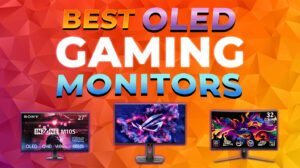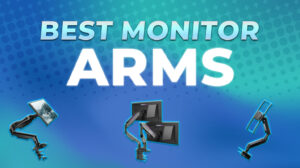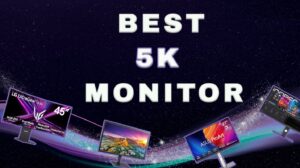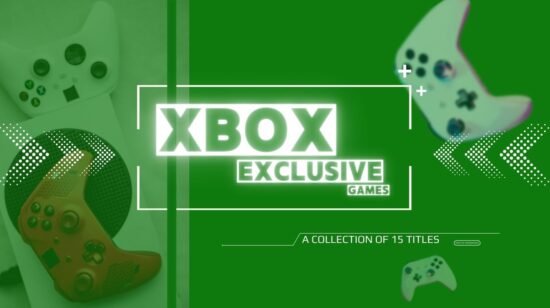7 Best Gaming Tablets With Amazing Specs To Get in 2025
Eneba Hub contains affiliate links, which means we may earn a small commission if you make a purchase through them—at no extra cost to you. Learn more

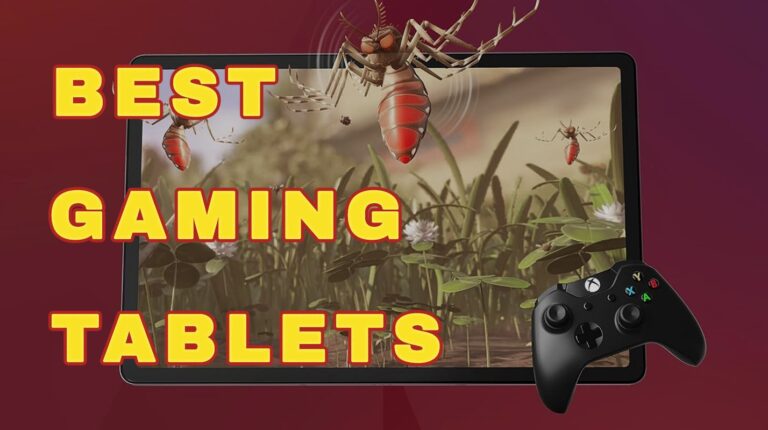
Recent update
This list is regularly updated to match what’s trending and in-demand among gamers.
If you’ve been looking for the best gaming tablets to liven up your handheld gaming experience, then look no further – you’ve just struck gold. As a hardcore gamer who’s frequently on the go and loves being able to play wherever and whenever I want, I’ve been following this topic closely myself, and my vast experience as a tablet gaming fan has paid off quite nicely.
My countless years of waiting for and checking out phenomenal releases from many tablet brands have taught me everything one should consider when picking out outstanding tablets from mediocre ones. Not all of them are made equal, after all, and the sheer variety of tablet models alone might make it hard for some gamers to decide which gaming tablet to spend their hard-earned money on.
To help you with what was once a problem for me, I have listed the highest-tier widescreen mobile gaming devices below, which any self-respecting gamer would be glad to have – from cost-effective budget and mid-range gaming tablets that offer great FPS per dollar to high-end flagships that can run all the latest AAA games without even coming close to throttling.
Think you’ve seen great tablets? Try these on for size!
Jump to:
Our Top Picks for Gaming Tablets
Here are our team’s top picks for gaming tablets that outclass all others when it comes to their overall specs, affordability, and pure processing prowess:
- SAMSUNG Galaxy Tab S9 11” – an amazing all-around device with superb specs across the board, offering fantastic value for your money.
- Amazon Fire HD 8 – an astoundingly cheap gaming tablet that offers solid performance. Perfect for gamers with a tight budget.
- Apple iPad Pro 11-Inch (M4) – a costly yet very attractive showpiece by Apple, featuring an Apple M4 chipset that sports tremendous processing power, as well as a stunning OLED display.
Still not sure these are the best tablets for you? Read on, and you’ll see exactly why they’re well worth their cost, as well as four other great alternatives that might be more to your liking, budget-wise or specs-wise.
7 Best Gaming Tablets Right Now (Get Your Money’s Worth!)
Looking for a tablet that delivers smooth, powerful gaming without draining your wallet? The best gaming tablets strike the perfect balance of performance, graphics, and battery life, making them ideal for both casual and competitive players.
We’ve rounded up the top options that truly give you the most value for your money.
1. SAMSUNG Galaxy Tab S9 11” [Best Overall Gaming Tablet]
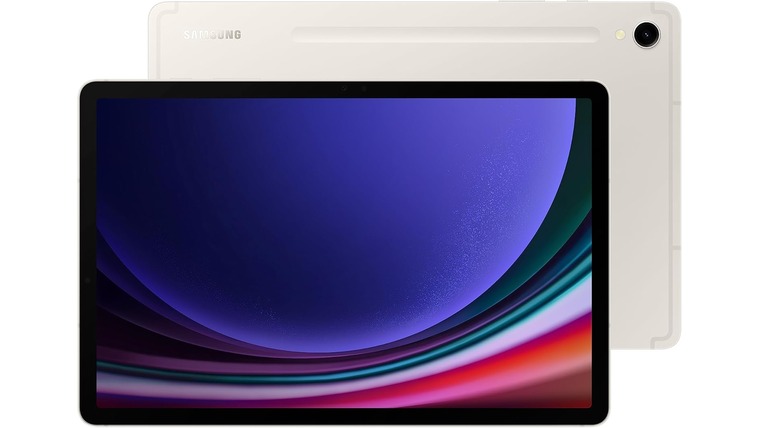
| Specs | Details |
|---|---|
| Chipset | Snapdragon 8 Gen 2 with Adreno 740 GPU |
| Display Screen | 11’’ Dynamic AMOLED 2X |
| Max Resolution & Refresh Rate | 1600 x 2560 pixels at 274 ppi, 120Hz |
| RAM | 8GB / 12GB |
| Storage | 128GB / 256GB / 512GB |
| Battery Capacity | 8400 mAh |
| Available Colors | Beige / Graphite |
| Front Camera | 12MP |
| Back Camera | 13MP |
| Operating System | Android 15 |
I’ve been gaming on the Galaxy Tab S9 (11-inch) for months now, and it’s honestly hard to go back to anything else. The Snapdragon 8 Gen 2 and the 120Hz Dynamic AMOLED 2X display make fast-paced shooters like Call of Duty: Mobile and PUBG Mobile feel silky smooth. I barely notice frame drops, and the colors pop in a way that makes portable gaming feel a little unfair compared to most laptops in this price range.
Battery life has been solid. I can grind through a couple of Genshin sessions or stream a series before I even think about charging. And when I do, the 45W fast charging actually helps – I’m back with a meaningful top-up in under an hour (a full charge takes longer, but it’s still quick enough that I don’t plan my day around it). It pairs easily with my controller and hasn’t given me any compatibility headaches.
A nice bonus this year: the Tab S9 picked up One UI 7 (Android 15) in April 2025, which brought some polish to performance and quality-of-life features. On the support side, Samsung promises four Android OS upgrades and five years of security updates, with patches arriving on a quarterly schedule. That gives the S9 decent future-proofing without forcing you to jump to the newest model every year.
In Game Launcher → Game Booster, toggle Priority mode and set Processing speed to High; then enable each game’s 120 fps option to fully use the 120 Hz AMOLED.
Compared with the newer Tab S10 lineup, the S9 still holds its ground. It’s roughly the same size as the 11-inch S10 and more portable than the S10+ and Ultra. You do sacrifice screen real estate if you love big, cinematic gaming or movie nights, but for handheld play, the 11-inch size feels just right.
Overall, the Galaxy Tab S9 isn’t the cheapest gaming option, but it nails the balance of power, portability, and longevity better than anything else I’ve used in 2025. When you’re paying around $600 before accessories, you want something that feels premium and stays reliable day to day – and this does.
| Pros | Cons |
| ✅ Stunning 120Hz AMOLED display hooks you into every frame ✅ Snapdragon 8 Gen 2 ensures competitive-level performance and stability ✅ Long-lasting battery with fast charging keeps you in the game ✅ Lightweight and portable – great for handheld marathons ✅ Solid software support | ❌ Smaller screen than the Plus/Ultra models – less cinematic, but also less bulk and easier to wield for bedtime gaming sneaks |
Final Verdict: A compact, gaming-ready tablet that nails power, portability, and longevity. With Snapdragon 8 Gen 2, a 120Hz AMOLED, and strong long-term support, it’s an easy pick – unless you need a bigger screen.
2. Amazon Fire HD 8 [Best Budget Gaming Tablet]
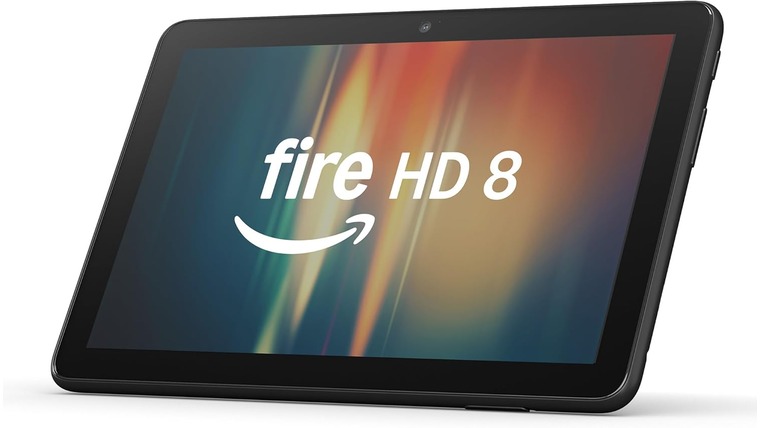
| Specs | Details |
|---|---|
| Chipset | MediaTek MT8169A with Mali-G52 2EE MC2 GPU |
| Display Screen | 8” high-definition IPS touchscreen |
| Max Resolution | 1280 x 800 at 189 ppi |
| RAM | 3GB / 4GB |
| Storage | 32GB / 64GB |
| Battery Life | Up to 13 hours |
| Available Colors | Black / Emerald / Hibiscus |
| Front Camera | 2MP |
| Back Camera | 5MP |
| Operating System | Amazon Fire OS 8 (Android 11 base) |
This little 8‑inch tablet surprised me more than I expected. Inside, the Fire HD 8 (12th generation) packs a hexa-core processor paired with either 3 GB or 4 GB of RAM, depending on your storage choice – 32 GB gets you 3 GB RAM, and 64 GB comes with 4 GB RAM. In real-world use, the extra RAM noticeably smooths out app switching and keeps casual games from stuttering.
That battery buzzes quietly, clocking in around 13 hours of active use – a solid run for video binges or Kindle reading sessions. Charging’s nothing spectacular, but the IPS HD display is bright and easy on the eyes, even if it won’t blow you away with pixel density.
One thing that stood out this year: Amazon added some neat AI features – Writing Assist, Webpage Summaries, and a Wallpaper Creator that spins up fun backgrounds from simple prompts. In practice, Writing Assist helped me polish my quick social posts, and webpage summaries made skimming news articles less of a chore. Clever touches for a budget device.
Keep games on internal storage (move media to microSD) and use 5 GHz Wi-Fi; this cuts stutter and speeds loads on Fire OS.
On the downside, don’t expect blazing speed. Some Reddit users note it’s “good for reading, for movie watching… but slow, not OK for web browsing”. I experienced the same – light browsing is fine, but load-heavy sites can lag.
Price-wise, starting around $99.99 but going as low as $55, this tablet punches above its weight for casual entertainment and light productivity.
In short, the Fire HD 8 isn’t a powerhouse, but its sweet price, long battery life, modest performance boost, and smart AI perks make it a solid everyday companion for streaming, reading, or casual fun.
| Pros | Cons |
| ✅ Improved RAM (3 GB or 4 GB) boosts multitasking ✅ Has an expendable storage of up to 1TB ✅ Long 13 hour battery for all-day use ✅ Smart IPS HD screen – clear and easy on the eyes ✅ Fresh AI features (Writing Assist, Summaries, Wallpaper Creator) ✅ Very affordable | ❌Sluggish under heavier web browsing or multitasking – but acceptable at this price |
Final Verdict: The Fire HD 8 won’t replace your laptop or gaming rig, but for under a hundred bucks it nails the basics – streaming, reading, light gaming, and now even some handy AI tricks. If you want an affordable, all-day companion for casual use, this little tablet more than earns its spot.
3. Apple iPad Pro 11-Inch (M4) [Best iPad for Gaming]
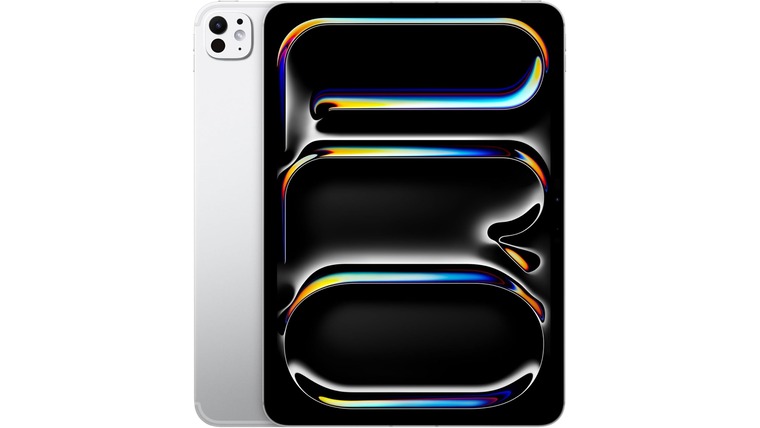
| Specs | Details |
|---|---|
| Chipset | Apple M4 |
| Display Screen | 11’’ Ultra Retina XDR Display (Tandem OLED) |
| Max Resolution & Refresh Rate | 2420 x 1668 pixels at 264 ppi, 120Hz |
| RAM | 8GB / 16GB |
| Storage | 256GB / 512GB / 1TB / 2TB |
| Battery Capacity | 31.29 Wh |
| Available Colors | Silver / Space Black |
| Front Camera | 12MP |
| Back Camera | 12MP |
| Operating System | iPadOS |
The 11-inch iPad Pro with Apple’s new M4 chip is, in short, the fastest tablet I’ve ever touched. Games and creative apps fly, and the new GPU even supports hardware-accelerated ray tracing – titles are still catching up, but the headroom is real. The performance jump from the M2 iPad is obvious the moment you load something demanding, and it’s exactly why many people now call it the best iPad for gaming in 2025.
The screen deserves its own standing ovation. Apple calls it Ultra Retina XDR, which sounds like marketing jargon until you see it. The tandem OLED panel pushes colors so rich and blacks so deep that even a simple Netflix binge feels cinematic. For gamers, the 120Hz ProMotion refresh rate makes fast-paced titles run like butter, while HDR peaks at 1600 nits give explosions that extra “pop.”
For portability, this thing is unbeatable. At just under half a kilo, it slips into my bag and disappears until I need it. And with the latest 2025 iPadOS refinements, juggling multiple apps side by side finally feels smooth instead of cramped. The battery life comfortably gets me through a full workday of writing, video calls, and a bit of Netflix – though heavy gaming drains it faster.
In supported titles, switch on 120 fps and use Guided Access during sessions to block accidental home-bar swipes – perfect for sweaty matches.
It’s not flawless. The price tag starts at $999, which is very much “Apple tax included,” and if you add the Magic Keyboard and Pencil Pro, you’re closer to MacBook territory. Also, while iPadOS has come a long way, it still feels like the hardware is sometimes waiting for the software to catch up.
But as of 2025, no other compact tablet balances sheer performance, jaw-dropping visuals, and portability quite like the iPad Pro 11-inch M4. If you can stomach the price, it’s the best tablet experience money can buy.
| Pros | Cons |
| ✅ Blistering M4 performance with console-level graphics ✅ Gorgeous Ultra Retina XDR OLED display ✅ Super thin, light, and portable ✅ Excellent battery life for work and casual use ✅ Apple Pencil Pro and Magic Keyboard unlock serious productivity ✅ iPadOS ecosystem polished and reliable | ❌ Premium pricing (especially with accessories), edging into MacBook territory |
Final Verdict: The iPad Pro 11-inch (M4) is overkill in all the right ways – blazing fast, stunning to look at, and light enough to carry everywhere. It won’t replace the best gaming laptops for hardcore play, but as a portable all-in-one powerhouse, it’s the sleekest tablet you can buy in 2025.
4. OnePlus Pad 2 [Best Gaming Tablet for Long Battery Life]
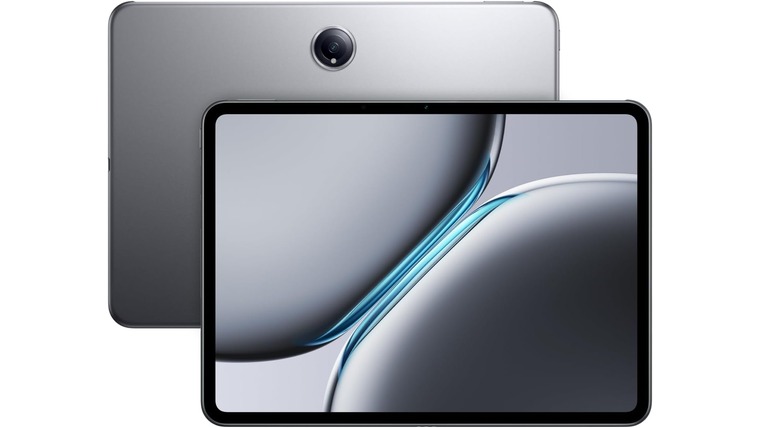
| Specs | Details |
|---|---|
| Chipset | Snapdragon 8 Gen 3 with Adreno 750 GPU |
| Display Screen | 12.1’’ IPS 12.1’’ IPS LCD Display |
| Max Resolution & Refresh Rate | 3000 X 2120 pixels at 303 ppi, 144 Hz |
| RAM | 12GB |
| Storage | 256GB |
| Battery Capacity | 9,510 mAh |
| Available Colors | Nimbus Gray |
| Front Camera | 8MP |
| Back Camera | 13MP |
| Operating System | OxygenOS 14.1 |
I’ve been carrying around the OnePlus Pad 2 like it’s the Holy Grail of portable power – and honestly, that screen-on time alone is worth the attention. Powered by the Snapdragon 8 Gen 3 and paired with 12GB of RAM, this thing chews through high‑end games and multitasking like it’s swiping right on low battery alarms. Sustained performance is strong, though some reviews note throttling under heavy, prolonged loads.
But here’s the fun part: the massive 9,510 mAh battery keeps you gaming for over 11 hours of mixed use in my testing – that’s entire workdays plus an evening raid, without scrambling for a charger. And when you do need juice? The 67W fast charging gets you back in action in under 90 minutes.
Setup is smooth. It plays nice with Bluetooth controllers, and installing games from the Play Store is painless. After‑sales support feels decent, and with regular security patches – Android 15 updates rolling in, brings sleek animations, Live Alerts, AI Reply, and partial screen recording as of early 2025 – OnePlus isn’t leaving you hanging. The April 2025 security patch just landed, too.
Open Game Tools and enable Pro Gamer Mode/HyperBoost, lock brightness, and set per-game refresh to 120/144 Hz for stable frames; quick-top-up with the 67 W charger between rounds.
Value-wise, this tablet punches well above its $500-ish weight. It’s more affordable than a Galaxy Tab S10 Plus, yet packs flagship raw power and screen specs (12.1-inch 3K IPS display, Dolby Vision, 144 Hz, 900 nits). Sure, it’s not OLED and lacks expandable storage or IP rating, but for gaming, media, and creative scribbles, it hits a sweet spot.
In the Android tablet space, the OnePlus Pad 2 stands out with its long-lasting stamina, zippy performance, and fresh Android 15 goodies – but keep expectations realistic when it comes to specialized productivity use or fancy accessories.
| Pros | Cons |
| ✅ Snapdragon 8 Gen 3 + up to 12 GB RAM delivers top-shelf gaming and stability ✅ Monster battery life (11+ hours) with blazing 67W fast charging ✅ Gorgeous 12.1” 3K, 144 Hz IPS display with Dolby Vision ✅ Android 15 update brings AI Reply, Live Alerts, smoother UI, screen recording ✅ Excellent value compared to higher-priced competitors | ❌ No OLED, expandable storage, or IP rating – but easy to forgive at this price |
Final Verdict: The OnePlus Pad 2 nails the sweet spot between power, battery endurance, and price. It’s not as polished as an iPad Pro, but for gamers and creators who want marathon sessions without babysitting a charger, this is the tablet that actually keeps up.
5. Lenovo Tab P12 [Best Gaming Tablet for High Resolution]
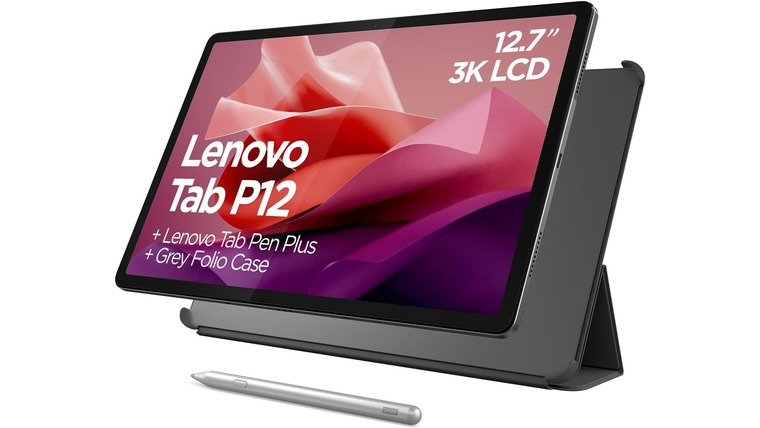
| Specs | Details |
|---|---|
| Chipset | Mediatek Dimensity 7050 with Mali-G68 MC4 GPU |
| Display Screen | 12.7″ 3K IPS Display |
| Max Resolution & Refresh Rate | 2944 x 1840 Pixels at 273 ppi, 60Hz |
| RAM | 8GB |
| Storage | 128GB |
| Battery Capacity | 10,200 mAh |
| Available Colors | Gray |
| Front Camera | 13MP |
| Back Camera | 8MP |
| Operating System | Android 14 |
The Lenovo Tab P12 is the kind of tablet that makes you stop mid-game just to admire the screen. Its 12.7-inch 3K display is the star here – bright, sharp, and spacious enough that every detail in a sprawling RPG or fast-paced MOBA feels alive. Pair that with quad JBL speakers, and suddenly your portable setup feels like a mini home theater that happens to fit in a backpack.
Performance-wise, the MediaTek Dimensity 7050 chip isn’t the most intimidating spec on paper, but in practice it handles popular titles like Pokémon Unite, Asphalt, and Call of Duty Mobile with ease. Frame rates stay smooth, loading times are respectable; just note the panel is 60 Hz, so you’re capped at 60 fps even if a title could push higher. For me, it’s been a dependable work-and-play machine: games in the evening, notes and light editing during the day.
Lenovo delivered on its promise of the Android 14 update in Q1 2025, which brought slicker animations and an overall fresher UI. Security patches have been rolling out steadily through this year, which helps ease the “how long will this actually last me?” anxiety.
That said, there was a brief hiccup earlier this year when a patch broke browser stability – tabs were freezing at the worst times – but a workaround helped, and later updates improved stability.
Set Dolby Atmos → Game profile and cap titles to 60 fps (the panel’s limit); keep internal storage free for faster loads.
At around $400 (pen included), the Tab P12 undercuts Samsung’s premium models while still delivering the kind of high-resolution experience you usually expect from pricier hardware. The trade-off? It’s a large tablet, a bit slippery without a case, and while the LCD is gorgeous, it doesn’t quite match the deep blacks of OLED rivals.
Still, if you care about resolution, screen size, and value in one package, the Lenovo Tab P12 is one of the easiest recommendations I’ve made in 2025.
| Pros | Cons |
| ✅ Expansive 12.7” 3K screen with rich color and detail ✅ Solid Dimensity 7050 performance for everyday gaming ✅ Android 14 update plus ongoing security patches ✅ Quad JBL speakers for immersive audio ✅ Versatile for both gaming and productivity | ❌ Slippery build and large size can be cumbersome – but manageable with a case |
Final Verdict: The Lenovo Tab P12 isn’t chasing raw power – it’s chasing pixels, and it nails them. With its huge 3K display, strong everyday performance, and fair price, it’s the go-to tablet for gamers and creators who want their worlds looking as sharp as possible
6. Samsung Galaxy Tab S6 Lite [Best Android Gaming Tablet]
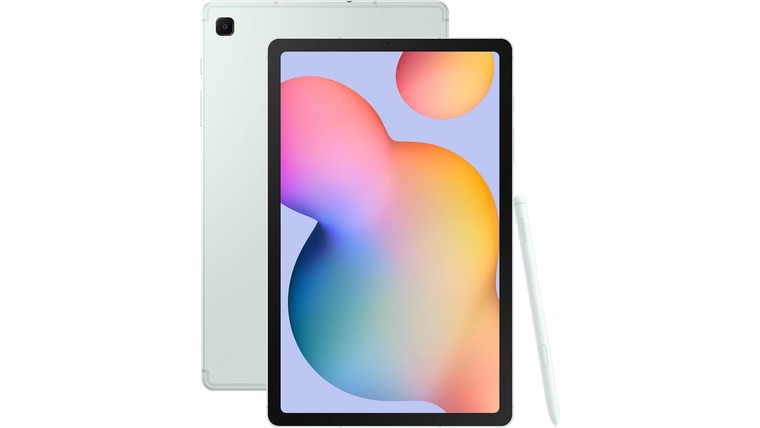
| Specs | Details |
|---|---|
| Chipset | Exynos 1280 with Mali-G68 GPU |
| Display Screen | 10.4’’ TFT LCD Display |
| Max Resolution & Refresh Rate | 1200 x 2000 pixels at 224 ppi, 60Hz |
| RAM | 4GB |
| Storage | 64GB / 128GB |
| Battery Capacity | 7040 mAh |
| Available Colors | Mint / Chiffon Pink / Oxford Gray |
| Front Camera | 5MP |
| Back Camera | 8MP |
| Operating System | Android 15 |
The Galaxy Tab S6 Lite isn’t trying to be the flashiest kid in Samsung’s lineup, but that’s exactly why it works so well. It’s the tablet you grab when you want reliable Android gaming without burning a hole in your wallet.
The Exynos 1280 chip isn’t a performance monster, but in real life, it runs popular titles like Genshin Impact (on medium settings) and PUBG Mobile without a meltdown. Lighter games feel effortless, and even after a couple of hours, the tablet never gets uncomfortably warm.
Samsung sweetened the deal this summer by rolling out Android 15 with One UI 7.0. The update makes the interface feel faster, the icons cleaner, and even adds under-the-hood optimizations that make hopping between apps less of a stutter-fest. Plus, with security patches landing in May 2025, it’s clear Samsung hasn’t abandoned this “lite” sibling.
Use Game Launcher → Priority mode to block alerts and free resources, then dial graphics to Medium/60 fps in shooters for smoother play on the Exynos.
The real ace up its sleeve is value. Priced around $200 (often less during sales), it throws in the S Pen at no extra cost, which is a win for doodlers, note-takers, and casual creators.
The 10.4-inch LCD screen is crisp and roomy, and the battery comfortably lasts a full day of gaming, streaming, and browsing. Charging is slower than I’d like, but I’d rather have stamina than a tablet that begs for the charger after three hours.
Compared to Samsung’s newer Tab S10 Lite, the S6 Lite is showing its age – lower refresh rate, older chipset – but it’s still one of the most balanced budget Android gaming tablets you can buy. For anyone who wants a capable, dependable tablet without climbing into flagship pricing, the Tab S6 Lite continues to hold its ground in 2025.
| Pros | Cons |
| ✅ Affordable – great price especially during discounts ✅ Includes S Pen for sketching, annotating, doodling during loading screens ✅ Decent performance for casual gaming via Exynos 1280 ✅ Lightweight, easy to hold for extended sessions | ❌ LCD screen lacks OLED contrast, and occasional lag shows in heavier multitasking – but still impressively capable at this price |
Final Verdict: The Galaxy Tab S6 Lite won’t blow you away with bleeding-edge specs, but for around $200 it nails the essentials – solid gaming, an included S Pen, and dependable battery life – making it one of the most budget-friendly Android tablets.
7. REDMAGIC Nova NP03J [Best Gaming Tablet for Competitive Players]
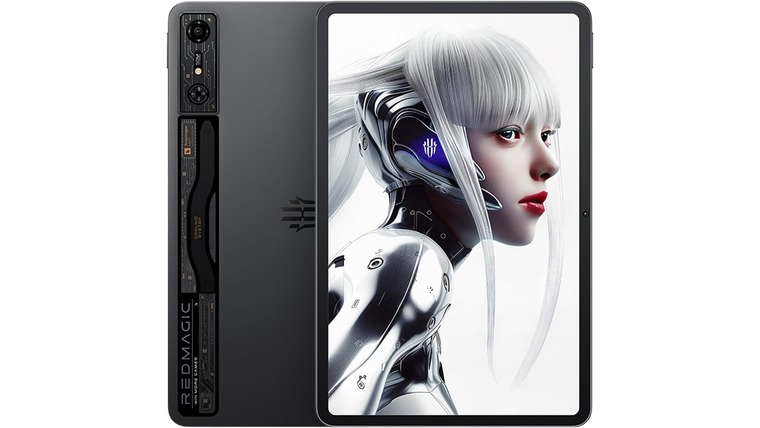
| Specs | Details |
|---|---|
| Chipset | Snapdragon 8 Gen 3 with Adreno 750 GPU |
| Display Screen | 10.9’’ IPS 2.8K Display |
| Max Resolution & Refresh Rate | 2880 x 1800 pixels at 312 ppi, 144Hz |
| RAM | 12GB / 16GB |
| Storage | 256GB / 512GB |
| Battery Capacity | 10,100 mAh |
| Available Colors | Midnight Black |
| Front Camera | 20MP |
| Back Camera | 50MP |
| Operating System | REDMAGIC OS 9.5 |
The REDMAGIC Nova isn’t a casual tablet – it’s built for players who count frames and milliseconds. Powered by the Snapdragon 8 Gen 3 Leading Edition and up to 24GB of RAM, it’s a beast that refuses to choke even in high-stakes matches. In my time with it, competitive titles like Fortnite and COD Mobile stayed consistently smooth, even while multitasking with Discord and Spotify in the background.
The 10.9-inch 2.8K screen is equally tuned for competition. A 144Hz refresh rate plus 840Hz touch sampling means taps feel instant, swipes land with precision, and reaction times actually feel faster. It’s the kind of panel that spoils you – switching back to a regular 60Hz tablet makes everything feel sluggish.
Of course, that performance would mean nothing if it overheated. Luckily, REDMAGIC’s ICE 2.0 cooling system – complete with a built-in fan and 9-layer heat dissipation – keeps things cool. Even after hours of play, I didn’t see throttling or hear the fan whining. The 10,100mAh battery is equally impressive, running comfortably through a long day of gaming. And when it finally dips, the 80–120W charging (depending on your region) gets you back in business shockingly fast.
In Game Space, switch to Performance/Super Performance, enable 144 Hz for supported games, and use the touch-tuning options for faster input response.
At around $700, it’s positioned as a gamer’s tablet first and foremost. You sacrifice some polish and broad ecosystem perks, but you gain raw performance, gaming-centric features, and a flashy transparent design with RGB lighting.
The downside? Availability can be inconsistent, and after-sales support isn’t as smooth as Samsung or Apple. Still, for serious players, it delivers where it counts.
| Pros | Cons |
| ✅ Snapdragon 8 Gen 3 Leading Edition with up to 24GB RAM ✅ 2.8K 144Hz display with ultra-fast touch response ✅ Advanced cooling system keeps performance steady ✅ Huge 10,100mAh battery with ultra-fast charging ✅ Strong gaming-focused software features | ❌ Availability and support vary by region, but worth the chase if you can snag one |
Final Verdict: The REDMAGIC Nova isn’t a do-it-all tablet – it’s a purpose-built weapon for competitive gamers, delivering blistering speed, flawless cooling, and a screen that responds faster than you can blink.
Things to Consider When Choosing a Gaming Tablet
Being able to pick out good tablets from less impressive ones is essential. You need to make sure that the device you’re planning on purchasing is capable of running all your favorite games beforehand, lest you’re open to wasting cash for very little return.
To help you with this, here are all the things you need to check up on before buying a gaming tablet, as well as the specs I recommend for each component:
1. Processor (CPU) and Graphics (GPU)
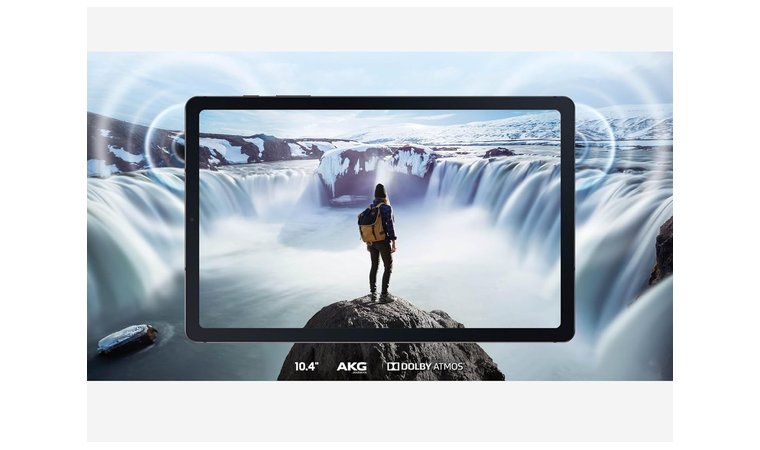
Unlike their PC counterparts, mobile CPUs and GPUs come in pairs. This means that any processor (i.e., chipset or SoC), no matter which tablet they’re put on, will always have the same integrated GPU. To avoid all the confusion and hassle, you don’t really need to know how to distinguish between GPUs to figure out if a tablet is good for gaming or not – just their CPUs.
On that note, here are the four major mobile CPU brands for tablets, as well as some of their most notable processors that excel in gaming performance:
| Best Snapdragon Processors for Tablets | Best Mediatek Processors for Tablets | Best Apple Processors for iPads | Best Exynos Processors for Tablets |
|---|---|---|---|
| Snapdragon 8 Elite (Gen 4) | Dimensity 9400 | Apple M4 | Exynos 1380 |
| Snapdragon 8 Gen 3 | Dimensity 9300 and 9300+ | Apple M3 | Exynos 1280 |
| Snapdragon 8 Gen 2 | Dimensity 9000 and 9000+ | Apple M2 | |
| Snapdragon 8 Gen 1 | Dimensity 7300 | Apple M1 | |
| Snapdragon 7 | Dimensity 8300 | Apple A17 Pro | |
| Snapdragon 6 | Dimensity 8100 | Apple A16 Bionic | |
| Snapdragon 800 series | Dimensity 7300 | Apple A15 Bionic | |
| Snapdragon 700 series | Dimensity 7050 | Apple A14 Bionic | |
| Helio G99 | |||
| Helio G88 |
Do note that I haven’t touched upon 2-in-1 laptop-tablet hybrids with mobile Intel Core and AMD processors, as they’re more akin to gaming laptops than a tablet and thus require an entirely separate list.
For regular tablets, the best CPU for gaming right now is the Apple M4, with the Apple M3 trailing behind. There are rumors of the Oppo Pad 4 Pro with a Snapdragon 8 Elite (Gen 4) and the Vivo Pad 4 Pro with a Dimensity 9400 being released this year, although they’re both likely to only be comparable to the Apple M3 in terms of gaming performance.
2. Display
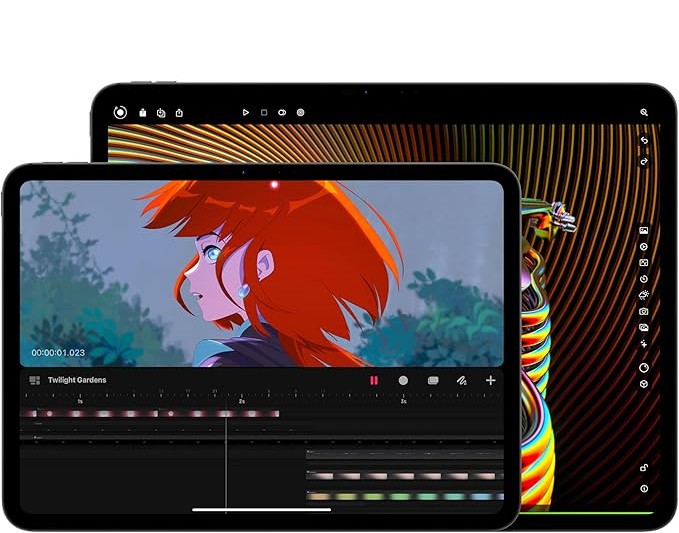
For your gaming tablet’s display screen, you’ll need to consider these four factors first and foremost:
- Screen Size: A larger display provides a more immersive experience, but consider portability. Tablets with high-inch screens tend to be bulkier and less convenient to carry around.
- Resolution: Higher resolution offers sharper visuals. Also, consider PPI (pixels-per-inch), as high-res displays with denser pixels tend to produce crisper images.
- Refresh Rate: A higher refresh rate results in smoother, highly responsive gameplay.
- Panel Type: IPS panels offer good color accuracy and viewing angles, while OLED panels provide vibrant colors and deep blacks.
Your preferences matter most when it comes to screen size, resolution, and panel type, so feel free to take your pick depending on your likes and dislikes.
However, if you like playing MOBA, MMO, beat ‘em up, or intense FPS games where fast inputs and reaction times matter, I would highly recommend getting a tablet with at least a 120Hz refresh rate for that extra competitive edge.
3. RAM (Memory)
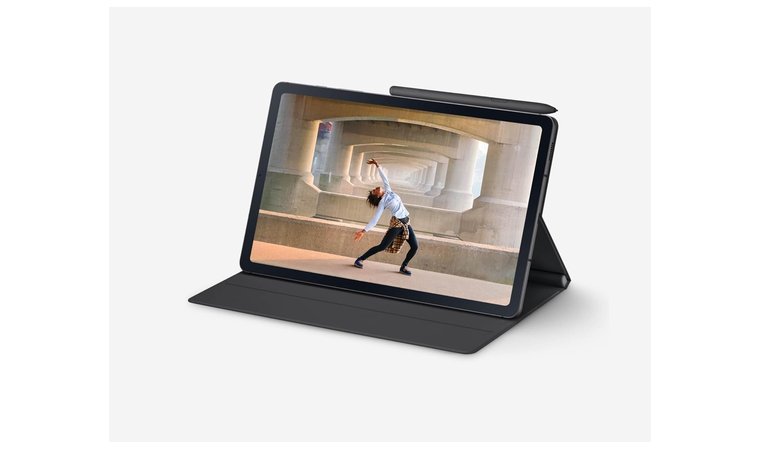
The more RAM a tablet has, the lower your chances of lagging or crashing while playing games or running multiple apps simultaneously.
If you’re concerned about pure gaming performance, then I recommend getting a tablet with 8GB RAM. But if you’re on a budget, tablets with 4GB RAM should be a good “bare-minimum” option, as long as you’re willing to make compromises in some games, settings-wise.
4. Storage
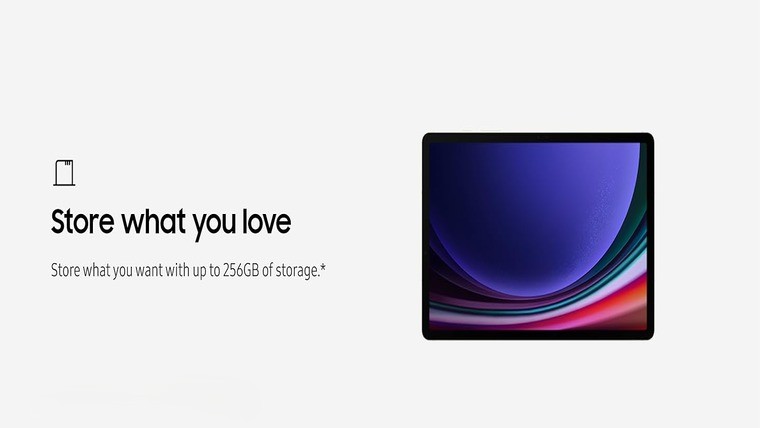
It’s the same with the RAM; the more storage space you have on your tablet, the better. After all, some AAA mobile games like Genshin Impact, Call of Duty: Mobile, and Diablo Immortal now typically exceed 10GB in total size.
Ideally, you should get a tablet with 128GB of internal storage to accommodate these modern games. For budget gamers, 64GB of internal storage should be a good starting point, especially if the tablet is expandable via an SD card.
5. Battery Life
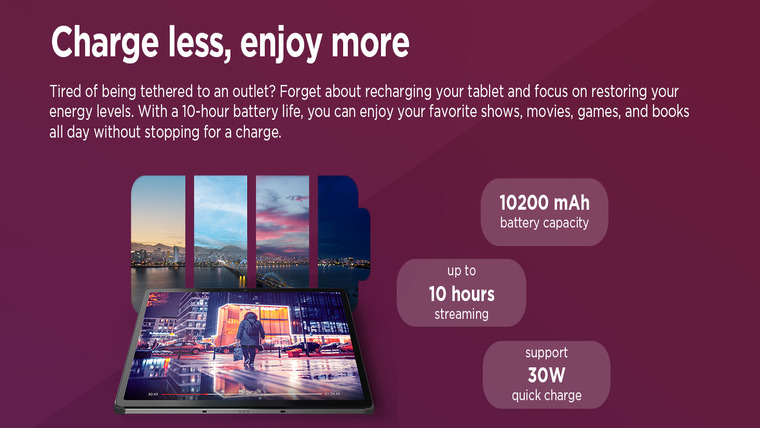
A tablet’s battery life is a crucial factor to consider for gamers, especially hardcore ones who like to game for hours at a time. Judging a tablet’s battery life is a bit straightforward, as most of the work is done by comparing mAh or Wh (for iPads), which are usually stated in a product’s specs sheet.
To generalize, a tablet with an 8000 mAh battery (around 30 Wh for the iPad) with fast charging should be the sweet spot. Then again, you must also consider a few other elements, such as refresh rate, max resolution, and the processor’s energy efficiency.
Tablets that are capable of higher refresh rates and max resolutions tend to be more power-hungry, especially those with processors with poor energy optimization.
6. Operating System (OS)
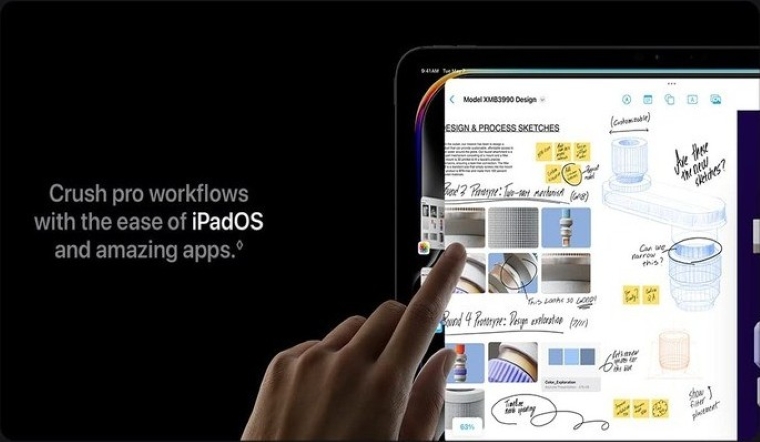
There are two common operating systems for gaming tablets, and those are the Android OS and iPadOS. Neither of the two can be considered the best for gaming, per se, and I wouldn’t recommend choosing a tablet solely for its operating system, anyway.
Nevertheless, I prefer tablets with Android OS when it comes to sheer app compatibility and user customization. Some gaming tablets, like the OnePad Plus 2 and the Amazon HD Fire 8, have custom operating systems that are derivatives of the Android OS.
Meanwhile, iPads with the iPadOS generally have better, streamlined performance due to Apple’s more impressive chipset lineup.
7. Connectivity
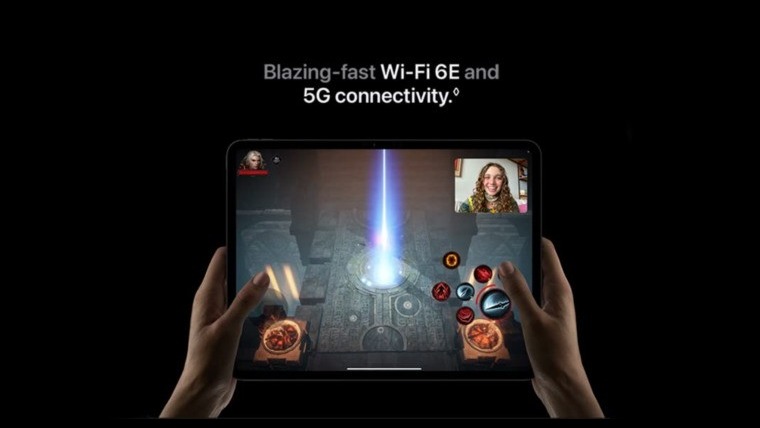
In terms of Bluetooth and Wi-Fi connectivity, a tablet that supports Wi-Fi 6 and 5G mobile data would be optimal for gaming.
Wi-Fi range can be an issue if you opt for devices with Wi-Fi 5 or lower, but some of the best Wi-Fi extenders in the market can easily trivialize this problem, so I wouldn’t be too worried.
FAQs
What is the best gaming tablet?
The best gaming tablet is the Samsung Galaxy Tab S9 11”. It features an impressive set of components that’s bolstered by a powerful Snapdragon Gen 2 chipset, not to mention it’s also reasonably priced.
Can you use tablets for gaming?
Yes, you can use tablets for gaming. In fact, most tablets nowadays are specifically designed for gaming and are installed with powerful chipsets that can run graphically demanding games smoothly.
What tablets will play Roblox?
Any tablet with at least Android 6.0 OS or higher will play Roblox. For Apple products, a device with 64-bit iOS 12 or greater is required. Tablets with the Amazon FireOS, on the other hand, require at least Fire 7, Fire HD 8, Fire HD 10, and Fire Max 11, depending on the device’s generation.
Is the Android 14 tablet good for gaming?
Yes, Android 14 tablets are generally good for gaming. This is because tablets released with Android 14 typically feature good components to support the OS due to its recency, although they have been reported to struggle with older games on rare occasions.
How much RAM do I need for a gaming tablet?
A gaming tablet should have at least 8GB RAM for a smooth, lag-free gaming experience. Though for ultra-budget tablets, having anywhere from 4GB to 6GB RAM is still viable depending on what type of games you play or if you’re willing to use medium to low settings.
Is the Lenovo tablet good for gaming?
Yes, Lenovo tablets are good for gaming. The Lenovo Tab P12 and Lenovo Tab Extreme, in particular, are both amazing high-end products that are perfect for any gamer looking for a reliable, premium gaming tablet.




